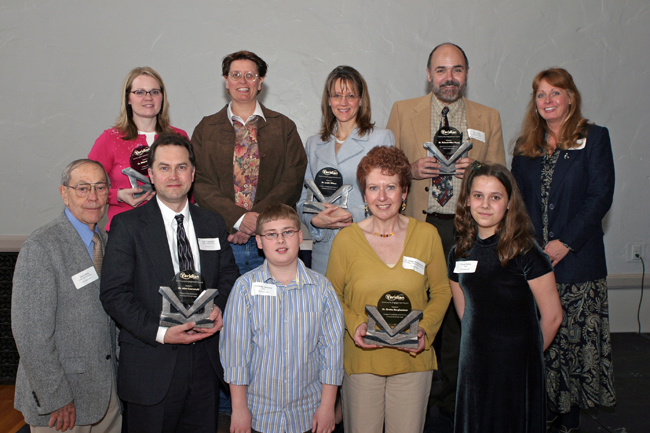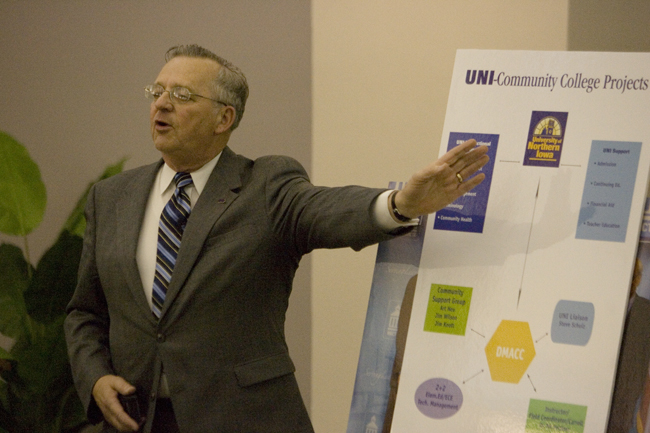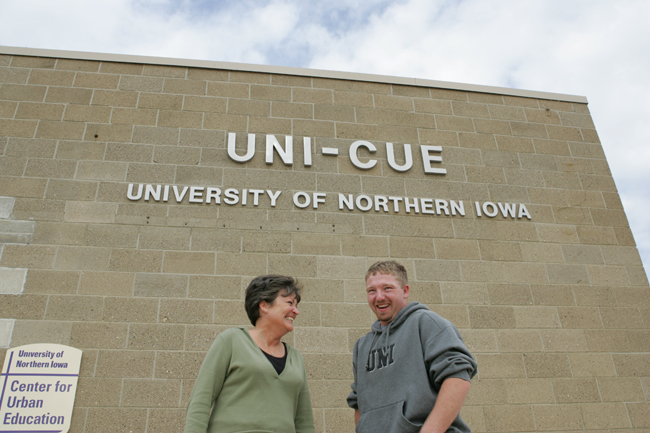CHAPTER 7: CRITERION FIVE: ENGAGEMENT AND SERVICE
Core Component 5a: The organization learns from the constituencies it serves and analyzes its capacity to serve their needs and expectations.
Core Component 5b: The organization has the capacity and the commitment to engage with its identified constituencies and communities.
Core Component 5c: The University of Northern Iowa demonstrates its responsiveness to those constituencies that depend on it for service.
Core Component 5d: Internal and external constituencies value the services the organization provides.
Criterion 5 Summary
Core Component 5a: The organization learns from the constituencies it serves and analyzes its capacity to serve their needs and expectations.
Engagement and Service – Central to UNI’s Mission
The University is committed to serving the needs of its constituents. Many units are engaged in outreach and the University has the capacity to support them. Service to others is a core component of UNI’s culture, values, vision, and mission statements. One goal in the strategic plan focuses on “addressing critical local, state, national and global needs.” Further, the University places priority on facilitating opportunities for service to the community. Objective 3.2 of the plan directs the University to “Develop opportunities for students, faculty, and staff to provide services to the greater community as part of their academic, co-curricular and extracurricular activities.”[1]
Recent UNI Presidents have made community service and engagement a high priority. Under former President Koob, in 2006 the University was selected by the Carnegie Foundation for the Advancement of Teaching for its new Community Engagement classification for Curricular Engagement and Outreach & Partnerships. Under President Allen, in 2009 the University was honored by the Corporation for National & Community Service with a place on the President’s Higher Education Community Service Honor Roll for exemplary service efforts and service to America’s communities. The Community Service Honor Roll is the highest federal recognition a school can achieve for its commitment to service-learning and civic engagement.
Environmental Scanning
Many University units have close, ongoing connections with public agencies, businesses, and non-profit organizations in those areas of community concern to which these units’ particular areas of expertise are relevant. Through these connections they receive information concerning emerging community needs to which they may choose to respond through faculty, staff, or student service. These units also convey information and analysis to community entities, based on their scholarship and applied research.
To enhance their connections to the community, many UNI programs make use of advisory councils. UNI benefits from more than 900 individuals who serve on more than 70 different advisory councils and boards. Many of these councils and boards represent external constituencies.
Career Services annually conducts a survey of recent graduates to determine employment rates, place of employment, and number of students continuing their education. For the academic year 2007-2008, 73% of UNI graduates were employed, starting a business, or had other employment plans, and 12% had enrolled in graduate or professional education programs. The combined rate of 85% was a 12% increase over the previous year. Seventy-seven percent of 2007-2008 graduates were employed in the state of Iowa, and 82% of teacher education graduates were employed in Iowa.[2]
The UNI Alumni Association conducted a comprehensive electronic survey of alumni in 2008. The survey sampled a representative cross section of the total alumni population. The Association reviewed the results in FY09 and planned a variety of changes to programs and services in direct response to the needs expressed by alumni. For example, the Association sought financial partners on campus to be able to provide a comprehensive online career success service.
Diversity
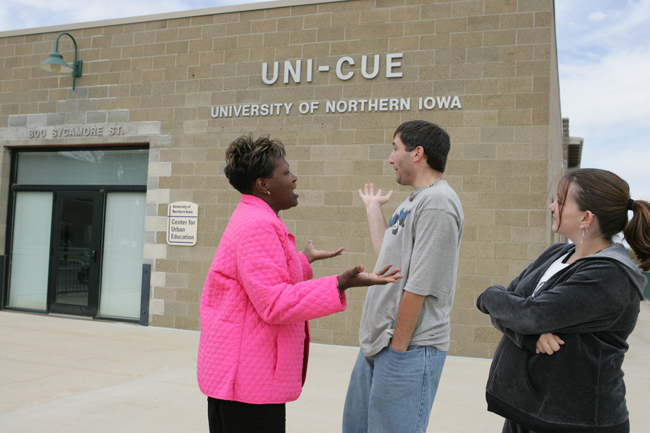 UNI is part of a metropolitan area that includes Cedar Falls, where it is located, and Waterloo, a neighboring community of 66,000 with a historically industrial base. Waterloo contains the largest concentration of African Americans in the state of Iowa (14% according to the 2000 U.S. Census), and it also contains significant numbers of Latino and Bosnian immigrants. Many of UNI’s service and outreach activities are directed at these disproportionately disadvantaged communities. For example, between 2000 and 2007, The Graduate Program in Public Policy received two Community Outreach Partnership Center Grants totaling $580,000 to provide direct services and community organizing to disadvantaged neighborhoods on Waterloo’s east side. In addition, UNI’s College of Education has been deeply involved in the efforts of the Waterloo Schools to reduce the educational achievement gap between students of color and white students, and Business and Community Services has worked to encourage small business development in these non-white areas. Another example of serving needs in the community is the project on Disability, Literacy, and Inclusive Education for Young Children, which provides literacy education for children with significant disabilities.[3]
UNI is part of a metropolitan area that includes Cedar Falls, where it is located, and Waterloo, a neighboring community of 66,000 with a historically industrial base. Waterloo contains the largest concentration of African Americans in the state of Iowa (14% according to the 2000 U.S. Census), and it also contains significant numbers of Latino and Bosnian immigrants. Many of UNI’s service and outreach activities are directed at these disproportionately disadvantaged communities. For example, between 2000 and 2007, The Graduate Program in Public Policy received two Community Outreach Partnership Center Grants totaling $580,000 to provide direct services and community organizing to disadvantaged neighborhoods on Waterloo’s east side. In addition, UNI’s College of Education has been deeply involved in the efforts of the Waterloo Schools to reduce the educational achievement gap between students of color and white students, and Business and Community Services has worked to encourage small business development in these non-white areas. Another example of serving needs in the community is the project on Disability, Literacy, and Inclusive Education for Young Children, which provides literacy education for children with significant disabilities.[3]
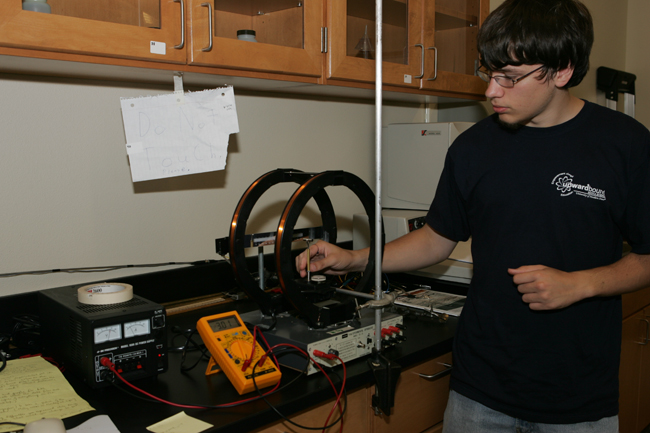
The University values the diverse constituencies it serves and works diligently to meet their needs. Several University programs have as their primary focus the needs of non-white, non-traditional, international, and first-generation college students. The UNI Center for Urban Education (UNI-CUE) has a longstanding history of recruiting, motivating, and encouraging students of diverse backgrounds to pursue career goals and aspirations through higher education. It collaborates with other University departments and community programs to serve identified needs and supports a variety of TRIO programs including the Educational Opportunity Center, Educational Talent Search, and Upward Bound.
The Center for Multicultural Education’s mission is to “foster success in American racial and ethnic minority students, contribute to the cultural competence of all students, and promote an appreciation of diversity in the University community.” This center assists with minority student retention through the Gaining Panther Success Mentor Program, which supports students during their first year at UNI. It also sponsors speakers and events throughout the year, including a yearly student trip to historical sites around the U.S. that have been important in the struggle for social justice.
The Northern Iowa Student Government (NISG) also helps to promote diversity on campus. The NISG Director of Diversity and Student Life focuses on co-curricular activities and organizations that promote diversity among the student population.
Community Needs
UNI programs and services address a broad range of identified community needs. These can be grouped into six broad categories:
- Pre-K–12 education. This service area involves not only multiple activities of the College of Education but also faculty and students from the natural sciences, the social sciences, and the arts. For example, there is an urgent need to close the achievement gap between students of color and white students, which UNI faculty are addressing in partnership with the Waterloo Schools.
- Business and economic development. This service area encompasses a variety of business support and outreach activities: multiple services offered by the Business and Community Services Division; consulting and service by faculty and students in the College of Business Administration; and support for environmental innovation by business through the Center for Energy and Environmental Education and the Department of Industrial Technology. For example, beginning small businesses require technical support in order to reduce their high failure rate.
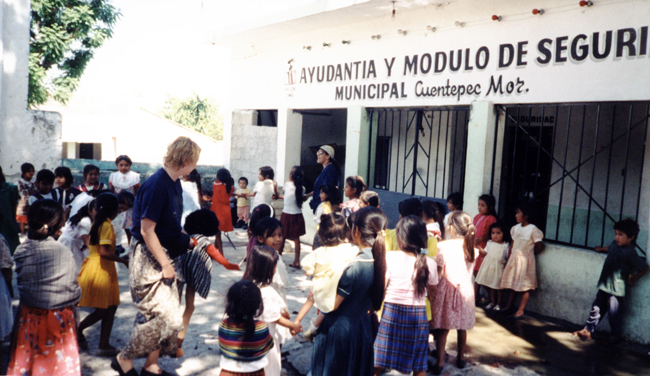 Human services. The multiple needs of citizens are addressed by a variety of programs in the College of Social and Behavioral Sciences such as Social Work and Family Services and by programs in the Division of Health, Physical Education and Leisure Services such as the Global Health Corps and American Humanics. The business and education programs also assist disadvantaged populations by enhancing economic growth and opportunity. For example, families in disadvantaged circumstances are benefiting from a variety of supportive interventions in which UNI faculty and staff have played an important role.
Human services. The multiple needs of citizens are addressed by a variety of programs in the College of Social and Behavioral Sciences such as Social Work and Family Services and by programs in the Division of Health, Physical Education and Leisure Services such as the Global Health Corps and American Humanics. The business and education programs also assist disadvantaged populations by enhancing economic growth and opportunity. For example, families in disadvantaged circumstances are benefiting from a variety of supportive interventions in which UNI faculty and staff have played an important role.- Health. The School of Health, Physical Education and Leisure Services encompasses many service activities related to community health education, fitness, and safety. Other programs, such as the interdisciplinary Gerontology Certificate and Project Export (concerned with racial and ethnic minority health disparities) also address important health issues. For example, there are urgent children’s health needs in relation to obesity reduction and to the elimination of lead paint poisoning.
- Environment. Numerous service programs in the College of Natural Sciences and in the Business and Community Services Division address a variety of environmental concerns, and faculty and students from the social sciences and education are also involved in environmental issues. For example, many businesses are eager to reduce their energy costs and their negative impact on the environment but require technical assistance to do this in a cost-effective manner. The Center for Energy and Environmental Education also provides resources for educators, the community, and businesses.
- Quality of Life. Numerous activities related to the arts and culture are carried out within the College of Humanities and Fine Arts, including music and theater education and outreach. The Gallagher-Bluedorn Performing Arts Center[4] and the UNI Museums[5] are also important centers of outreach in this area. For examples, schools that are facing tight budget restrictions need assistance in enriching the arts and cultural components of their curricula. The university offers many youth sports camps, and the UNI-Dome serves as a venue for collegiate and high school athletics, as well as for non-athletic events such as trade shows. UNI fields competitive Division I athletic teams, which draw thousands of spectators from the community to campus. Educational camps are also offered on campus during the summer for elementary, middle, and high school students.[6]
Continuing Education and Special Programs
Consistent with its mission as a state university, the University of Northern Iowa is actively engaged in providing distance education opportunities to the citizens of Iowa through the Continuing Education and Distance Education Office. During the 2008-2009 academic year, UNI offered credit courses in 185 cities and towns, serving 87 of the state’s 99 counties. Total enrollment in all Continuing and Distance Education courses, both on- and off-campus, increased from 9,049 in 1998-1999 to 11,127 in 2008-2009.
With its history as a teacher education institution, it is not surprising that UNI’s distance education efforts are heavily but not exclusively focused on graduate degree opportunities for teachers. The following is a list of the degree, certificate and endorsement programs that UNI makes available to Iowans:
| Degree | Program |
|---|---|
| B.L.S. | Bachelor of Liberal Studies* |
| B.A. | Elementary Education* |
| B.A. | Technology Education* |
| Ed.D. | Educational Leadership |
| M.A.E. | Early Childhood Education |
| M.A.E. | Educational Leadership (Principalship) |
| M.A.E. | Elementary Education |
| M.A. | Teaching English as a Second Language (ESL/TESOL) |
| M.A. | Instructional Technology |
| M.A.E. | Literacy Education |
| M.A. | Math for the Middle Grades (4-8) |
| M.A. | Mathematics: Secondary Emphasis |
| M.M. | Music Education |
| M.A. | Philanthropy and Nonprofit Development |
| M.A. | School Library Studies |
| M.A. | Science Education |
| M.A. | Social Science for Teachers Grades 6-12 |
| M.A.E. | Special Education – Early Childhood |
| M.A. | Teaching English in the Secondary Schools Advanced Certificate in the Superintendency (K-12) Driver Education Endorsement Endorsement in Education of the Gifted Endorsement in English as a Second Language (ESL) Reading K-8 Endorsement |
| *Degree completion program |
These programs are offered using the cohort model in which a group of students moves through a predetermined sequence of courses in unison. The primary delivery method is the Iowa Communications Network (ICN), an interactive system with over 750 video classroom sites across the state. The system provides for real-time interaction using broadcast-quality video and audio. Most courses are supported with an eLearning component, and some include one or more face-to-face meetings.
The Office of Continuing and Distance Education continually seeks out new areas for which demand exists for distance education courses and programs. In recent years, a number of programs have been initiated and designed in response to the needs of specific audiences. For example, the Office continues to offer the Philanthropy and Nonprofit Development graduate program – a degree that was created because a specific distance education market opportunity was identified. Similarly, a master’s degree in Social Science for Teachers Grades 6-12 was developed in 2007, and in 2009, a distance education graduate program, Teaching English in the Secondary Schools, was developed to meet the needs of teachers.
In addition to the above programs, UNI offers a variety of Guided Independent Study courses, workshops, and single course opportunities. Distance education delivery relies heavily upon campus-based faculty and strives to offer the same quality off campus as is offered on campus, including access to Rod Library and other needed services.
UNI uses a variety of methods to inform its constituent groups of distance education opportunities, including informational meetings, a very active Web site, targeted e-mails, and targeted mailings, as well as press releases as needed.
Summary of Core Component 5a
Strengths
- UNI has participated in two major community engagement initiatives of the American Association of State Colleges and Universities (AASCU) during the last five years: the American Democracy Project and Making Place Matter.
- The University maintains close contact with community constituencies such as businesses, pre-K–12 educational institutions, non-profit service organizations, and neighborhood groups.
- UNI draws thousands of people to campus each year by fielding highly competitive athletics teams and hosting events and shows at the Gallagher-Bluedorn Performing Arts Center.
- The University makes available a wide variety of Continuing and Distance Education opportunities throughout the state of Iowa. Two Master of Arts in Education (MAE) programs were recently approved by the Higher Learning Commission for web-based delivery: Elementary Education and Professional Development for Teachers.
Challenges
- Such a diverse range of service programs requires some coordination to ensure they match the academic strengths of university.
Back to Top
Core Component 5b: The organization has the capacity and the commitment to engage with its identified constituencies and communities.
To gather information for the self-study on the full range of community engagement and service activities at UNI, a survey was distributed electronically to all academic and non-academic departments in December 2008, asking them to report community service projects in which they were involved during the 2007-2008 academic year and the fall 2008 semester. A total of 42 units responded to this survey, and they reported 192 community service projects. They also reported a total of 408,805 student hours and 41,782 faculty hours devoted to these projects. It is likely that some service activities were not reported. However, these responses indicate a very high level of involvement by the campus community in addressing the needs of the surrounding community.[7] As another example of UNI’s commitment, in 2010 the Provost’s Office allocated grant funding for faculty to develop service-learning components in their courses.
Table 1 below reports the types of community needs addressed by these projects using categories of the Corporation for National and Community Service. Projects serving at-risk youth were the most common category, followed by community/economic development, health/nutrition and culture/arts performances. The large number of projects in the disaster/emergency response category reflects UNI’s strong response to the dual disasters of a tornado and a flood which struck the geographic area in summer 2008.
Table 7.1 Community Needs Served by Reported Projects 2007-2008
| Need Served by Project | Number of Projects Addressing this Need* | Percent of Projects Addressing this Need. | |
|---|---|---|---|
| At-risk Youth | 46 | 17.8% | |
| Community/Economic Development | 42 | 16.3% | |
| Health/Nutrition | 26 | 10.1% | |
| Culture/Arts/Performance | 25 | 9.7% | |
| Disaster/Emergency | 23 | 8.9% | |
| Education/Dropout prevention | 22 | 8.5% | |
| Environment | 16 | 6.2% | |
| Mentoring | 14 | 5.4% | |
| Youth Development | 13 | 5.0% | |
| Senior citizens | 5 | 1.9% | |
| Employment | 2 | 0.8% | |
| English as a Second Language | 2 | 0.8% | |
| Homelessness | 2 | 0.8% | |
| Hunger | 1 | 0.4% | |
| Other | 19 | 7.4 % | |
| Total | 258 | 100.0% | |
| *Total number of projects = 192. One project can serve more than one need. | |||
Data from the National Survey of Student Engagement (NSSE) provide a sense of overall student involvement in community service projects during their enrollment at UNI. In the 2009 survey at UNI, 64% of seniors reported they had participated in a volunteer activity during their time at UNI. Responses to questions from the American Democracy Project Consortium, which were included with NSSE questions in 2008, indicated that 27% of first-year students and 39% of seniors had assisted with fundraising for a charitable organization, while 32% of first-year students and 43% of seniors had volunteered with a local community organization or religious group. In these and other community-oriented activities, seniors generally reported more frequent participation than first-year students.[8]
Among seniors, the NSSE survey reported that 58% had participated in an internship or practicum during their academic careers. However, participation in service learning within the context of a course was much more limited. Only 6% of first-year students and 16% of seniors reported service learning experiences during their current year. These figures were substantially below those of other American Democracy Project schools and below those of UNI’s benchmark institutions. The University acknowledges that it needs to take additional measures for service learning.
Administrative Leadership
The continuity of UNI’s strong commitment to community service is reflected in the support expressed by current UNI President Allen and immediate past President Koob. During his 11-year term, President Koob initiated several community-wide collaboration efforts directed at education, economic development, and poverty reduction. He was instrumental in establishing the Greater Cedar Valley Alliance,[9] a corporation established to assist Waterloo/Cedar Falls and the surrounding area with economic and community development. Since assuming the presidency in 2006, President Allen has continued this strong commitment to community service by emphasizing it as one of the major themes of his presidency. At the groundbreaking ceremony for the Human Performance Center in July 2006, he stated that this facility is “a hallmark example of the University’s commitment to engagement with the larger community.”
A further indication of UNI’s senior-level commitment to community engagement is shown by the involvement of the President’s staff in promoting it. The Special Assistant to the President for Board and Governmental Relations took the lead in assembling and submitting UNI’s successful application for Elective Classification as a Community Engagement Institution by the Carnegie Foundation for the Advancement of Teaching. She also took the lead in UNI’s successful application for designation on the National Service Honor Roll by the Corporation for National and Community Service.
Service Awards
As an example of UNI's commitment to service, and in an effort to encourage continued faculty, staff, and student involvement in the community, UNI honors members of the University who are engaged in service. In addition to collegiate and department- level recognition, there are University-wide awards given for service each year:
- The Ross Nielsen Faculty Service Award is presented yearly to a faculty member who has displayed exemplary service to the community and to the University.
- The Veridian Community Engagement Award was established in 2006 to recognize outstanding contributions of faculty in the community. Veridian Credit Union annually selects up to five recipients, potentially one for each of the five undergraduate colleges. Faculty recipients are recognized, and the monetary award is given to the non-profit organization he or she designates.
- The Eunice A. Dell Award[10] for “Making a Difference” was established in 2009 by the Division of Administration and Financial Services and annually recognizes division employees who have made a difference by their actions. Criteria under which an individual may be nominated include nurturing diversity and respect; promoting service, activism, and engagement; modeling compassion for others; providing access and opportunity; and leading the way.
- The Lux Service Award,[11] established in 1984, annually recognizes undergraduate students who best demonstrate and uphold the ideal of service to the University community. Nominees must have completed at least 90 credit hours and have a minimum of a 3.0 GPA.
Coordinated Communication of Service Activities
The Community Relations Coordinator in University Marketing & Public Relations serves as a central information source for UNI’s service and outreach activities. Using UNI Online, the electronic bulletin board for the campus, this office informs the University community of service opportunities and events. In addition, this office works to insure timely press coverage of service activities, and it regularly communicates to the University community instances in which UNI faculty, staff, or students receive state or national press coverage.
Community engagement is featured on the UNI homepage under the heading “Outreach and Partnerships” with the statement, “Service to Iowa is a cornerstone of our mission.” The page provides links to resources for businesses, communities, educators, employers, the general public, and distance learners.[12]
In addition, the Northern Iowan, the UNI student newspaper, regularly features the University’s community engagement activities, emphasizing the myriad of ways students can become more active in the community. As the organizer of the 2006 Volunteer Fair at UNI stated, “I hope students come away knowing that they are needed in this community. Getting involved with volunteering can be a way to make a meaningful impact on your community.”[13] The University of Northern Iowa Today alumni magazine, UNI’s Speakers Bureau, and other University publications also provide information that highlights services available to businesses and economic development leaders.
American Democracy Project
Since 2004, UNI has participated in the American Democracy Project (ADP) initiative of the American Association of State Colleges and Universities (AASCU). The goal of the American Democracy Project is to promote civic engagement and service as an integral part of students’ education. The ADP Committee has provided training for faculty in service learning, sponsored civil dialog between those with opposing views on controversial issues, and enlisted faculty to engage in dialog with the public on important issues through its News Talk sessions.[14] Members of the ADP Committee took the lead in the recent application for service learning funding from the Corporation for National and Community Service. They are also exploring the implementation by UNI of the Public Achievement model for middle and high school student civic engagement developed by Dr. Harry Boyte at the University of Minnesota.
Summary of Core Component 5b
Strengths
- UNI includes a variety of departments and programs that offer a broad array of services to the community in all six of the areas defined earlier in this report: pre-K–12 education, business and economic development, human services, health, the environment, and arts/culture.
- Services in each area are not confined to the units that are most obviously related to that area but are spread across multiple units that make creative connections between their areas of expertise and community needs.
- Student-sponsored activities also address a broad range of community needs.
- The University has sought institutional recognition for its service activities and recognizes individuals and units for their outstanding service.
Challenges
- A large percentage of UNI’s students engage in internships or practicums that are related to their fields of study; however, their engagement in service as part of their regular coursework is much more limited.
- UNI needs to provide additional opportunities for students to engage in service learning.
Back to Top
CORE COMPONENT 5c: The University of Northern Iowa demonstrates its responsiveness to those constituencies that depend on it for service.
The University of Northern Iowa responds to the needs of its constituencies by collaborating with organizations, community leaders, educational institutions, and communities in its areas of service. The University strives to pursue common goals with these bodies through strategic partnerships and collaborations where combining resources more effectively serves community and student needs. UNI departments and programs regularly receive positive feedback from individuals and organizations in the community concerning the services they provide. As an example, Scott Hall, Cedar Falls High School Orchestra Director, stated, “The UNI Suzuki program has had a tremendous influence on local public schools orchestra programs. Their work with students through private instruction, group instruction, and chamber orchestra settings enable players to reach higher levels of musical performance. This, in turn, improves school programs and challenges other students to play music at higher levels and degrees of difficulty.”[15]
Collaborative ventures with other higher
learning organizations
One key way that UNI responds to constituents who depend on the university for service is through the UNI 2+2 B.A. in Elementary Education and the B.A. in Technology Management programs. These programs are for students who are place bound. 2+2 students take two years of classes at their local community college and the equivalent of two years of UNI courses taught by UNI faculty at the community college or via distance education classes.
UNI also collaborates with University of Iowa and Iowa State University in serving the state through distance education efforts. The Regent Universities have cooperated in the creation of an Iowa Teacher Intern License program that is designed to prepare experienced post-B.A. individuals to teach in grades 7-12. The program will be delivered through a combination of distance education and face-to-face courses. UNI will provide coordination of the program, Iowa State University will lead evaluation efforts, and the University of Iowa will oversee registrations and the distance delivery of the program.
The University of Northern Iowa has a long history of supporting the mobility of learners, both those arriving at UNI from other universities and those transferring from community colleges. In 2007, the University initiated an Admissions Partnership Program (APP) with Iowa community colleges.[16] The purpose of the APP is to streamline the transfer process for community college students who want to earn a UNI undergraduate degree. APP assists current and future students in transitioning from the community college to UNI. Once accepted into APP, students meet regularly with academic advisors from both the community college and UNI to determine coursework and discuss degree progress. Other student benefits include guaranteed admission to UNI provided they meet requirements and make timely progress toward graduation. Students are provided the opportunity to participate in early orientation programs and scheduling for their first semester at UNI. They are guaranteed placement in UNI housing and access to campus and student resources with the payment of the student activities and services fee.
Participating community colleges are as follows:[17]
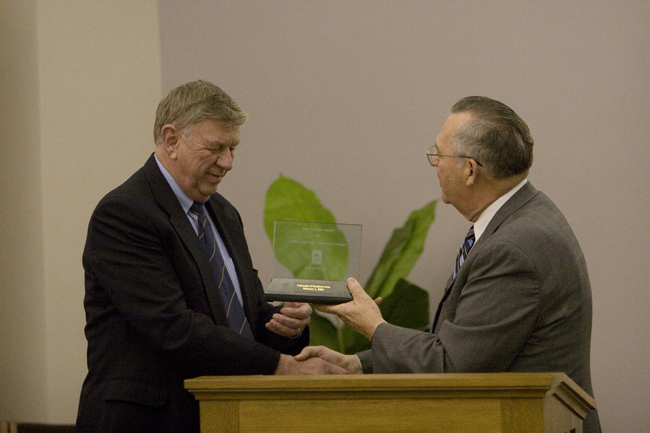 Hawkeye Community College: Waterloo, Iowa.
Hawkeye Community College: Waterloo, Iowa.- Des Moines Area Community College (DMACC): Carroll, Urban, West Campus, Boone, Ankeny, and Newton, Iowa.
- Northeast Iowa Community College (NICC): Calmar and Dubuque, Iowa.
- North Iowa Area Community College (NIACC): Mason City, Iowa.
- Iowa Valley Community College District: Marshalltown and Ellsworth, Iowa.
- Kirkwood Community College:
Cedar Rapids, Iowa. - Iowa Central Community College:
Fort Dodge, Iowa - Iowa Lakes Community College: Estherville and Emmetsburg, Iowa.
- Iowa Western Community College: Council Bluffs, Iowa.
Some UNI academic departments have developed relationships with corresponding community college departments to increase understanding of UNI course requirements and to prepare students to meet the rigor of the curriculum when they transfer.
The number of undecided students who are transferring with an A.A. degree to UNI is increasing annually. The Office of Academic Advising works with this population through a program of self-assessment, exploratory course work, and a decision making process to help students find a major before transferring. This provides students with increased degree options once they transfer.
UNI also partners with other academic institutions to provide better community service. In 2007, UNI entered into a collaborative relationship on community service with three other institutions in the Cedar Valley--Wartburg College, Allen College of Nursing, and Hawkeye Community College--and the Volunteer Center of Cedar Valley. The purpose of this collaboration is the enhancement of community service and service-learning opportunities for students at the four academic institutions.
Building Effective Bridges Among Diverse Communities
Since UNI is near Waterloo, which is a diverse city, the university provides service and educational opportunities to the community. The UNI Center for Urban Education(UNI-CUE), located in downtown Waterloo, seeks to provide a positive environment for lifetime learning. UNI-CUE staff collaborate with other campus departments and community programs to match the center’s resources with community needs. UNI-CUE supports a number of programs to assist area residents and University students to pursue their educational goals and prepare for careers: Educational Opportunity Center (EOC); Educational Talent Search (ETS); Classic Upward Bound (CUB); and the Iowa Math & Science Academy (IMSA).
- The Educational Opportunity Center (EOC) is a free academic counseling program for eligible adults who are age 19 or older and do not have a four-year degree. Its goal is to promote postsecondary education in communities with large populations of low-income, first-generation adults. Services include: assistance in selecting a postsecondary institution or training program, help with the completion of admissions and financial aid applications, scholarship searches, and defaulted student loans. It also provides academic development workshops and academic advising.[18]
- Educational Talent Search (ETS) is designed to assist Waterloo/Cedar Falls area students to complete their high school education and enroll in a postsecondary program. It also assists high school and college dropouts to return to school.[19]
- The Classic Upward Bound Program (CUB) is designed to provide participants with the academic skills and motivation necessary for success in high school and ultimately college. CUB serves students from low-income, first-generation families who demonstrate potential for college. During the academic year, CUB provides after-school Supplemental Instructional/Tutorials programs, academic advising and counseling, career exploration, college tours, study skill development workshops, leadership conferences, and other activities. During the summer, CUB students spend six weeks living in UNI residence halls and attend enrichment courses in mathematics, English, science, modern languages, economics, and computer science. In addition, students participate in cultural enrichment activities. Students earn credits which are transferable to the college or university that the student will attend in the fall.
- Iowa Math and Science Academy (IMSA) is designed to strengthen and support Iowa high school students’ interest in Science, Technology, Engineering, and Mathematics (STEM). The program is funded to serve 40 students in Black Hawk and four adjacent counties. Program participants must be either low-income or potential first-generation college students. The program seeks to build the skills and motivation necessary for students to succeed in completing high school and enrolling in and graduating from a postsecondary institution. An Individual Education Plan is developed for all participants based on their scores on the Iowa Tests of Basic Skills and/or Iowa Tests of Educational Development and academic progress in their current high school courses. During the summer residential component of the program, participants experience college life while still in high school, living on the UNI campus for six weeks (excluding weekends) while enrolled in summer courses taught by UNI faculty. In addition to course work, students experience daily recreational and enrichment activities. Students are eligible to receive college credit after successful completion of three summers in the IMSA program.[20]
In addition to the university's efforts through UNI-CUE, UNI also participates in the McNair Scholars Program. The Ronald E. McNair Post Baccalaureate Achievement Program, part of UNI's Graduate College, seeks to increase the number of low-income, first-generation, and racial and ethnic minority undergraduate students who compete for advanced degrees through effective preparation for doctoral study. The program prepares students through academic enrichment, graduate admission preparation workshops, a student research symposium, and attendance at conferences and professional meetings. The program has 14 current students and has served 88 additional students since 2000.
Finally, individual programs actively respond to community needs. For example, the Graduate Program in Public Policy began its engagement in low-income, non-white neighborhoods through a federal Community Outreach Center grant. However, since grant funding ended in 2007, the program has continued to engage in outreach efforts. It provides modest support to the Waterloo Neighborhood Coalition and the Making Neighborhoods Safe Committee. The Committee recently collaborated with Iowa Workforce Development, Inc., as it designed its 2009 Summer Youth Jobs program, which was funded by federal stimulus funds. Finally, the Public Policy Program Director is a member of the Community Partnership for Protecting Children, a community task force of agencies and citizens who are concerned with promoting the safety and well being of families and children in Black Hawk County. An example of a program initiated by CPPC is the local implementation of the Effective Black Parenting program, a nationally recognized curriculum that conveys important information on parenting to African-American families in a culturally appropriate manner.
Professional Licensing
One additional way that UNI responds to community needs is to provide licensures, certificates, and endorsements needed by licensed professionals in the community. UNI offers the following:
- Advanced Studies Certificate in Superintendency
- Driver Education Endorsement
- Endorsement in Education of the Gifted
- Graduate Early Childhood Education Endorsement Program (GECEEP)
- Reading K-8 Endorsement Courses
- English as a Second Language (ESL)
- Environmental Health Certificate
- Career and Technical Education Endorsement, Secondary Level
- Community College Professional Development
- Multi-occupations (MOC) Endorsement
- Teacher Updates
- Certificate in Criminology
UNI thus acts as a resource for the continued professional development of workers in the state.
Summary of Core Component 5c
Strengths
- UNI collaborates with community colleges to address the needs of individuals seeking a four year degree.
- UNI faculty and staff share their expertise with a variety of agencies, businesses and individuals.
- UNI addresses the needs of diverse elements of the community through UNI-CUE and other programs. During 2008-2009, 2,000 students were served through the Educational Opportunity Center, and 1,300 students were assisted through the Educational Talent Search program.
Challenges
- UNI needs to identify, assess, and prioritize community needs, and ensure service activities match academic strengths.
Greater community visibility also benefits UNI, in that it facilitates recruitment of a more diverse student body from these areas of the community, and it enriches the educational experiences of its students by exposing them to the diverse world in which they will make their careers and live their lives.
Back to Top
Core Component 5d: Internal and external constituencies value the services the organization provides.
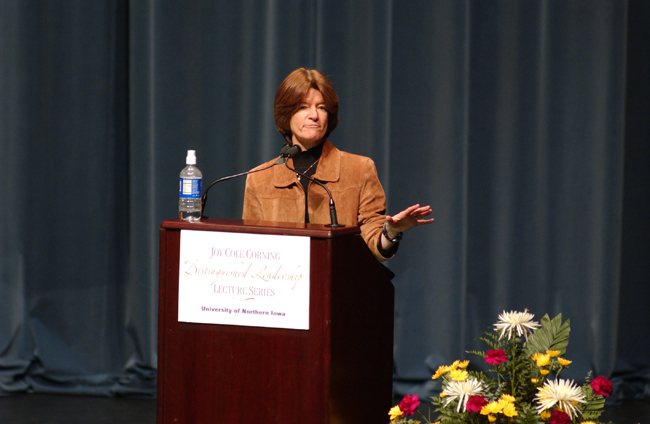 Most of the University’s programming activities are open to and well attended by the public, including the prominent speakers and guests hosted by UNI. Cornel West spoke on campus in March 2010, and the Joy Cole Corning Distinguished Leadership Lecture Series has sponsored Pulitzer Prize winner Thomas Friedman, former Secretary of State Madeleine Albright, and astronaut Sally Ride. This program, along with other sponsors, supported the campus visit and lecture of His Holiness the 14th Dalai Lama of Tibet in May 2010.
Most of the University’s programming activities are open to and well attended by the public, including the prominent speakers and guests hosted by UNI. Cornel West spoke on campus in March 2010, and the Joy Cole Corning Distinguished Leadership Lecture Series has sponsored Pulitzer Prize winner Thomas Friedman, former Secretary of State Madeleine Albright, and astronaut Sally Ride. This program, along with other sponsors, supported the campus visit and lecture of His Holiness the 14th Dalai Lama of Tibet in May 2010.
A number of University activities have community partners or co-sponsors. The Meryl Norton Hearst Lecture Series is funded by an endowment from James Schell Hearst and administered by the College of Humanities and Fine Arts. In February 2009, several offices on campus partnered with University Book and Supply (a private company) and the Cedar Falls Public Library to host Greg Mortensen, co-author of Three Cups of Tea. U.S. Secretary of Education Arne Duncan spoke on campus in April 2009 about priorities in education reform.
The Graduate Program in Public Policy has sponsored over 40 conferences on a wide range of public policy topics since 1994. These conferences have brought together distinguished national speakers with both University and community members, both as participants and as cosponsors or organizers of these events. Recent topics have included citizen participation, domestic violence, fairness in sentencing, and training in engaging diverse communities in social justice work.
University facilities are used by the community on an ongoing basis. These include the Maucker Union, Gallagher-Bluedorn Performing Arts Center, the Center for Energy and Environmental Education, the Slife Ballroom and reception areas in the UNI Commons, the UNI-Dome, and the McLeod Center. UNI-Dome activities include statewide athletic events, commercial expositions, and concerts.
The Department of Residence provides catering for both internally and externally sponsored events on campus. For example, weddings and wedding receptions are a common occurrence in the Maucker Union and UNI Commons.
The many summer camps offered by UNI are also popular with elementary, middle school and high school students. There are more than two dozen sports camps, and nearly two dozen academic camps,[21] scheduled for the summer of 2010.[22]
Academic departments offer continuing education also, often in coordination with the Division of Continuing Education and Special Programs. For example, the Department of Philosophy and World Religions, in cooperation with Social Work, conducts a medical ethics conference each fall for health professionals in the area. Continuing Education offers CEUs for the conference.
Evaluation of services
In order to ensure that valuable service is delivered, a number of community engagement programs conduct systematic evaluations of their service activities and track participation and results. Selected examples follow:
The Department of Social Work has conducted a yearly series of colloquia for practitioners since 2006. In all three years, over 90% of the participants were either highly satisfied or satisfied with what they learned through these events.
The Institute for Decision Making, in the Business and Community Services Division, has served 627 communities, counties and groups in nearly all of Iowa’s counties to date. Community clients report 1,500–2,000 new jobs annually as a result of IDM assistance.
The Business and Community Services Division reports the following economic impact for their MyEntrenet program for 2008:
- 835 small business owners engaged.
- 89 business starts or expansions.
- 176 FTE jobs created.
- $12,631,000 in new commercial/equity investment.
Summary of Core Component 5d
Strengths
- The University draws community members to campus on a regular basis for a wide variety of educational and cultural activities, such as concerts, lectures, conferences, and opportunities for professional certification.
Challenges
- There is a need to encourage and support more systematic program evaluation by all community service and engagement units. Such feedback will be useful in improving the effectiveness of UNI programs and projects in meeting community needs. It will also provide important documentation when UNI seeks external funding for additional service projects.
Back to Top
CRITERION FIVE SUMMARY
Faculty, staff, and students at UNI engage with the surrounding community in a wide variety of activities. In recent years, a number of programs have been created to deal with pressing community problems such as economic development and environmental sustainability, and their service is highly valued by those who receive it. UNI also serves diverse communities through dedicated offices such as UNI-CUE and through the efforts of individual departments to reach out to diverse populations. The university offered support to area residents in response to the flooding and tornadoes in 2008. The field headquarters of the Federal Emergency Management Agency and the Small Business Administration were housed on campus, and people who had to evacuate their homes were housed in the West Gym. Finally, many faculty members have taken it upon themselves to offer their expertise and support where it is needed in the community.
Building on this strong base of activity, UNI needs to develop a more comprehensive institutionalization of the University’s community service function through greater central coordination and promotion of service activities.
Strengths
- The University has sought and received institutional recognition from the Carnegie Foundation for its service activities and is a 2008 recipient of The President's Higher Education Community Service Honor Roll.[23] The clear commitment of UNI’s administration to community engagement is stated in the Strategic Plan.
- UNI recognizes staff members and units for their outstanding service.
- UNI has participated in two major community engagement initiatives of the American Association of State Colleges and Universities (AASCU): the American Democracy Project and Making Place Matter.
- The University makes available a wide variety of Continuing Education opportunities throughout Iowa.
- A variety of University departments and programs offer a broad array of services to the community in all six areas defined earlier in this report: pre-K–12 education, business and economic development, human services, health, the environment, and arts/culture.
- Student-sponsored activities also address a broad range of community needs.
- Through close coordination with community colleges, UNI has made active efforts to address the needs of individuals seeking to pursue degrees.
- UNI has been responsive to agencies, businesses, and individuals seeking the expertise of UNI faculty and staff.
- UNI has made a significant commitment to addressing the diverse needs of the broader community through UNI-CUE and other programs.
- The University draws community members to campus on a regular basis for a wide variety of educational and cultural activities including concerts, lectures, conferences, and opportunities for professional certification.
- UNI is clearly viewed as an important educational resource by many members of the community, not just by enrolled students.
- UNI athletic teams are competitive and receive statewide and national attention.
Areas for Improvement
- UNI needs to further develop and expand its activities in the area of service learning and encourage faculty who are experienced in service learning to provide mentoring for faculty who are new to the practice.
- There is a need to increase University awareness of the needs of diverse communities and to ensure these communities are aware of the expertise and services that UNI can provide.
Recommendations
- Ensure environmental scanning is done regularly to promote responsiveness, and to ensure the needs of diverse communities are met.
- Ensure there is awareness of the resources and programs that UNI offers.
- Provide incentives to faculty who are initiating service learning activities in their classes.

